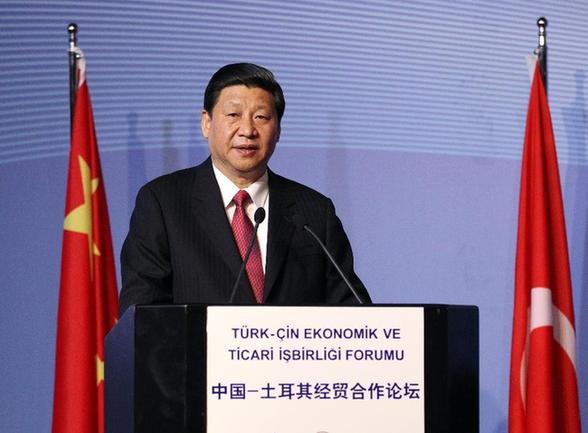China, Turkey sign $4.3b deals
 0 Comment(s)
0 Comment(s) Print
Print E-mail China.org.cn, February 23, 2012
E-mail China.org.cn, February 23, 2012
China and Turkey signed deals worth 4.3 billion US dollars in a wide range of sectors during Vice-Presdient Xi Jinping's three-day visit to the Europe-Asia gateway, Xinhua reported.
 |
| China's Vice-President Xi Jinping speaks during the Turkey-China Economic & Trade Cooperation Forum in Istanbul February 22, 2012. [Photo/Xinhua] |
Xi wrapped up his Turkey visit on Wednesday with a call to boost trade and cooperation hen addressing a Sino-Turkish business forum in Istanbul, attended by hundreds of business leaders from China and Turkey.
The forum was Xi's final event in Turkey and the last official engagement in a 10-day journey that saw him also visit the United States and Ireland.
In his forum address Xi rejected protectionism and called for enhanced cultural exchanges and more contact between the people of the two countries.
Xi suggested that both countries boost growth in various sectors including finance, renewable energy, high-tech and mining.
The three-day visit highlights China's readiness for greater cooperation with Turkey and is an example for developing countries, said Yao Kuangyi, former Chinese ambassador to Turkey.
"As big emerging economies, the two countries have great potential to cooperate," Yao told China Daily.
China also faces development challenges, especially in its vast western regions, he said.
China and Turkey both have concrete plans in place to boost development and aspects of their two economies dovetail nicely, Xi said.
Statistics show that bilateral trade increased from some $1 billion in 2001 to nearly $19 billion in 2011.
Since 2001, Chinese companies have signed deals involving Turkish projects worth more than $10 billion. These include the Ankara-Istanbul high-speed railway, the biggest joint project.
During Premier Wen Jiabao's visit to Turkey in 2010, the two countries pledged to increase trade to $50 billion by 2015 and $100 billion by 2020.
The central banks of the two countries also inked a currency swap worth $1.58 billion as part of efforts by Beijing to promote the yuan internationally.
Turkey's Deputy Prime Minister Ali Babacan urged Chinese banks to do more business in Turkey, according to AFP.
"We want Chinese banks to open more branches in Turkey ... We also want Turkish banks to be more active in China," Babacan said.
Xi's visit was an important diplomatic initiative at the connecting point of Eurasia, Dong Manyuan, deputy director of the China Institute of International Studies, said.
Sharing similar views on regional security issues, including the peaceful resolution of the Iran nuclear issue and the fight against terrorism, Dong said, the two countries have "a promising future" in cooperation.
In addition to political and economic cooperation, Yao said cultural cooperation is also important for the two countries.
The countries have a long history of exchanges dating back to ancient times.
Turkey has designated 2012 as a Chinese Cultural Year and China will host a Turkish Cultural Year in 2013.





